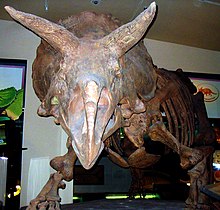Ceratopsians
| Ceratopsians Temporal range: Late Jurassic – Late Cretaceous, 158–66 Ma |
|
|---|---|
 |
|
| Triceratops skeleton, Smithsonian Museum of Natural History | |
| Scientific classification | |
| Kingdom: | Animalia |
| Phylum: | Chordata |
| Class: | Reptilia |
| Clade: | Dinosauria |
| Order: | †Ornithischia |
| Clade: | †Marginocephalia |
| Suborder: |
†Ceratopsia Marsh, 1890 |
| Subgroups | |
|
|
Ceratopsia or Ceratopia (/ˌsɛrəˈtɒpsiə/ or /ˌsɛrəˈtoʊpiə/; Greek: "horned faces") is a group of herbivorous, beaked dinosaurs that thrived in what are now North America, Europe, and Asia, during the Cretaceous Period, although ancestral forms lived earlier, in the Jurassic. The earliest known ceratopsian, Yinlong downsi, lived between 161.2 and 155.7 million years ago. The last ceratopsian species, Triceratops prorsus, became extinct during the Cretaceous–Paleogene extinction event, 66 million years ago.
Early members of the ceratopsian group, such as Psittacosaurus, were small bipedal animals. Later members, including ceratopsids like Centrosaurus and Triceratops, became very large quadrupeds and developed elaborate facial horns and frills extending over the neck. While these frills might have served to protect the vulnerable neck from predators, they may also have been used for display, thermoregulation, the attachment of large neck and chewing muscles or some combination of the above. Ceratopsians ranged in size from 1 meter (3 ft) and 23 kilograms (50 lb) to over 9 meters (30 ft) and 9,100 kg (20,100 lb).
...
Wikipedia
